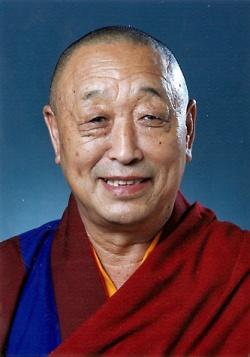His Holiness Menri Trizin 33rd Lungtuk Tenpai Nyima
His Holiness Lungtok Tenpa’I Nyima serves as the 33rd Abbot of Menri and is the worldwide spiritual head of the Bon religion of Tibet. He was born in 1927 in the far eastern province of Amdo, in the village of Kyongstang,Tibet.
When still a little boy, his mother died and an elderly friend of the family, A-Nyen Machen, offered to raise him. At the age of 8, his father, Jalo Jongdong brought him to the nearby monastery of Phuntsog Dargye Ling where he began preliminary studies such as reading, writing and chanting. He continued with his studies and at the age of sixteen he entered the Dialectic School at the monastery. After eight years of rigorous training under the guidance of Lopon Tenzin Lodro Gyatso, he received his Geshe degree in philosophy, specializing in Tibetan medicine, astronomy and astrology.
Soon after, at the age of 26, he traveled to eastern Tibet to the province of Gyalrong to print the Bon Kangyur, a set of over 100 volumes of sacred texts. The texts existed on woodblock, and were kept by the king Trochen Gyalpo, one of the eighteen kingdoms of Gyalrong. Using mules to carry the vast amount of printed texts, he then made the perilous six-month journey back to Phuntsog Dargye. Soon after his return, he set out as a pilgrim to China, on foot. He visited many holy sites and traveled to central Tibet in the Tsang province, furthering his studies in the Bon monasteries of Khana, Menri and Yungdrung Ling , where he became known as Sangye Tenzin Jongdong. By truck, he made the journey to the Drepung Monastery in Lhasa where he stayed for several years until the 1959 uprising. He fled on foot to Mustang, on the boarder of Tibet and Nepal, then to Nepal. Hearing word that the Abbot of Yung Drung Ling monastery and many Bonpo lamas had reached the Bon monastery of Samling, he went to join them. Coincidently, Dr. David Snellgrove, a researcher of Oriental and African studies from London University was doing research at Samling.
Prompted by the urgent need to preserve as many of the Bon texts and woodblocks as possible, this fortuitous meeting of Dr. Snellgrove provided him with the information as to where the texts could be reprinted in India. So he and the Abbot of YungDrung Ling set out to India from Nepal with mules laden with the precious cargo. Once there, with the help of Samten Gyaltson Karmay and Lopon Tenzin Namdak the texts were reprinted.
In 1962, Dr Snellgrove, with a grant from the Rockefeller Foundation, invited the three men to come to England,where they taught Tibetan culture and religion as assistants to Dr. Snellgrove.
Sange Tenzin JongDong stayed in England for three years, visiting and studying at a number of Benedictine, Cistercia, and other Christian monasteries and in 1964, he traveled to Rome and received a private audience with Pope Paul VI. Later that same year he returned to India, and at the request of the His Holiness the 14th Dalai Lama, started a school staffed with volunteer teachers from the West in Massori, Northern India. The school provided a high school education for Tibetan refugee boys who had completed the 8th grade. He remained as the head of the school for nearly three years, each month sending his salary of 300 rupies to the refugee Bonpo lamas living in Manali, India so that they could have food.
With the help of the Catholic Relief Service, in New Delhi, Lopon Tenzin Namdak was able to purchase some land in the Himachal Pradesh region in India, establishing Dolanji as the new home for the Tibetan Bonpo refugee community. At the invitation of the Tibetan scholar Per Kvaerne, Sangye Tenzin Jongdong traveled to Norway to teach history and religion at the University of Oslo.
It was when he was in Norway, on March 15th 1968 when he received a telegram from India which stated that the Protectors of Bon had selected him to be the 33rd Abbot of Menri.
